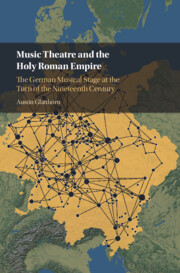 Music Theatre and the Holy Roman Empire
Music Theatre and the Holy Roman Empire Published online by Cambridge University Press: 14 June 2022
The final chapter explores music theatre as a cultural expression of the Empire. Dramatists and composers responded to current events by creating works of varying genres for the Empire's stages. Focusing on Günther von Schwarzburg (Mannheim, 1777; German serious opera) by Ignaz Holzbauer (1711–83), Oberon, König der Elfen (Vienna, 1789; Singspiel) by Paul Wranitzky (1756–1808), Heinrich der Löwe (Frankfurt am Main, 1792; Singspiel) by Carl David Stegmann (1751–1826), Die Feier des achtzehnten Jahrhunderts (Leipzig, 1794; melodrama) by Siegfried Schmiedt (1756–99), the anonymous Der Retter Deutschlands (Vienna, 1797; melodrama), and Achille (Vienna, 1801; opera seria) by Ferdinando Paer (1771–1839), this chapter argues that music theatre portraying the Reich called for cooperation in uncertain times by appealing to a sense of belonging to both local Estate and the Empire. Studies of these works tend to view them as expressions of an emerging German nationalism. This chapter challenges such perceptions, arguing that although the Reich was not a nation-state, composers nevertheless portrayed it as a complex nation and state, placing its past, present, and future centre stage.
To save this book to your Kindle, first ensure no-reply@cambridge.org is added to your Approved Personal Document E-mail List under your Personal Document Settings on the Manage Your Content and Devices page of your Amazon account. Then enter the ‘name’ part of your Kindle email address below. Find out more about saving to your Kindle.
Note you can select to save to either the @free.kindle.com or @kindle.com variations. ‘@free.kindle.com’ emails are free but can only be saved to your device when it is connected to wi-fi. ‘@kindle.com’ emails can be delivered even when you are not connected to wi-fi, but note that service fees apply.
Find out more about the Kindle Personal Document Service.
To save content items to your account, please confirm that you agree to abide by our usage policies. If this is the first time you use this feature, you will be asked to authorise Cambridge Core to connect with your account. Find out more about saving content to Dropbox.
To save content items to your account, please confirm that you agree to abide by our usage policies. If this is the first time you use this feature, you will be asked to authorise Cambridge Core to connect with your account. Find out more about saving content to Google Drive.